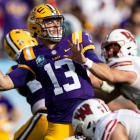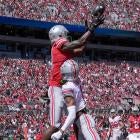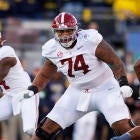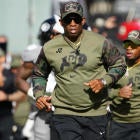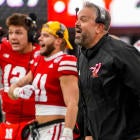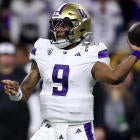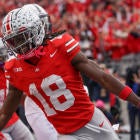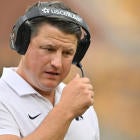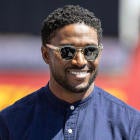The NCAA wants all of next month’s Ed O’Bannon trial to be delayed until February, citing the potential overlap of video game claims involving the Sam Keller plaintiffs, who have proposed now trying their case in February 2015.
The O’Bannon antitrust plaintiffs “cannot explain how the Court can conduct a meaningful bench trial and be assured that its factual findings will not impinge in any way on a common issue to be presented to the Keller jury,” the NCAA wrote in a filing Tuesday.
The nearly 5-year-old O'Bannon antitrust case over the use of college athletes’ names, images and likenesses was long go combined with the Keller rights-of-publicity case, which explores the NCAA’s culpability in the alleged use of athletes’ likenesses in college sports video games. But now the cases are potentially breaking off again in order to salvage some of the June 9 trial.
The NCAA claims the Seventh Amendment mandates that legal claims must be tried to a jury before equitable claims sharing any common issue -- an argument U.S. District Judge Claudia Wilken disagreed with last week. The NCAA cited these common issues in the O'Bannon and Keller cases:
• Did the NCAA conspire with Electronic Arts and Collegiate Licensing Company to deny payments for athletes’ names, images and likenesses?
• Do the video games meet the “transformative use” test that athletes have "cognizable" rights of publicity in the use of their names, images and likenesses?
• Do college athletes’ names, images and likenesses have economic value?
• Do the video games use athletes’ names, images and likenesses?
• The interpretation of and use of NCAA release forms for athletes’ publicity rights.
Judge disagrees with Seventh Amendment argument
At a hearing last week, Wilken disagreed that the Seventh Amendment was an issue with separate trials, according to a copy of the transcript. She told the parties she was inclined to proceed with a bench trial starting June 9 for the O’Bannon antitrust case and possibly sever issues related to video games for a February trial, but asked for feedback from all of the parties.
Wilken said her hangup was whether the video games actually use the names, images and likenesses of athletes, adding “that strikes me as an issue that would be unfortunate to have to try twice.”
Wilken suggested the possibility of a bench trial in June and entering a partial verdict or partial judgment. She said the final verdict or judgment on video games could then be answered at a jury trial with the Keller plaintiffs, perhaps in February.
At the hearing, NCAA attorney Glenn Pomerantz cited portions of the NCAA’s latest Seventh Amendment argument, but Wilken said she doesn't see an issue with the Seventh Amendment.
"We had originally two cases, the Keller case and the O’Bannon case," she said. "They were two cases. They happened to be assigned to the same judge or they were related to the same judge. They could have been tried separately in either order at any moment, so the fact that two cases happen to contain the same issues doesn’t raise the Seventh Amendment, as far as I’m concerned.”
Wilken said trying the cases separately does raise issues about rendering a conclusive decision about a set of issues so they cannot be relitigated in later proceedings involving the same parties. “There may well be some (issues over relitigating facts) if the cases were tried separately, but I can’t rule on them in advance,” she said.
Steve Berman, the lead attorney for the Keller plaintiffs, told Wilken that video games go to the heart of their case and shouldn’t be tried by the O’Bannon plaintiffs in June. Berman pointed out that Wilken previously noted in the class certification decision that the O’Bannon plaintiffs had not shown the plaintiffs’ names were actually used in video games.
“We will make that showing player by player,” Berman said. “We have a model that shows exactly who was used and so we think that you should wait to decide that part of the case until the party that has the most interest in presenting that issue does so.”
Michael Hausfeld, the lead attorney for the O’Bannon plaintiffs, told Wilken she might not even have to decide during the June antitrust trial whether actual images of players were or were not used. He suggested she could delay whatever decision might be necessary until after the Keller trial. The O'Bannon plaintiffs are seeking an injunction from Wilken that would end the NCAA's rules prohibiting football and men's basketball players from being paid based off their name, image and likeness.
“The antitrust restraint occurs before the actual video game is shown,” Hausfeld said, “so the decision with regard to whether or not there was an unlawful restraint that’s derived from the horizontal agreement among the NCAA conferences and its member institutions and then imposed on the licensees like EA is not dependent upon the actual depiction of the athletes in the actual video game.”
In a filing this week, the O’Bannon plaintiffs said some evidence of athletes’ likenesses in EA video games would likely be presented at the June trial, such as O’Bannon’s testimony. But the plaintiffs said that issue is not critical to their claims.
What about EA/CLC settlement?
Wilken also faces the issue of how to handle EA and CLC as defendants at a trial if she does not approve their video game settlement. The $40 million settlement, which was announced last September, is expected to be filed publicly soon for preliminary approval. Wilken asked for a private copy last week.
EA and CLC want the antitrust and video game trials together in February or later. Both companies want to avoid ongoing litigation over an issue they settled while the settlement process occurs. Former and current college athletes will have to decide whether to opt in or out of the settlement, assuming it's approved.
CLC said the proposed schedule for video game claims is “unworkable and prejudicial" to the company. The Keller plaintiffs’ proposal for final approval of the EA/CLC settlement is January 2015 or later, about a month until the proposed February trial on video games.
EA suggests combining the cases for a trial in April or later, in part to avoid confusing class members “since there are different considerations involved in opting out of a settlement and of claims yet to be tried.”
Attorneys for the Keller plaintiffs and NCAA acknowledged to Wilken last week they have been in settlement talks over the right of publicity claims. Pomerantz, the NCAA attorney, told Wilken that "if there were any settlement with the right of publicity plaintiffs, it may have effects on the O'Bannon case and that's part of our discussions."












